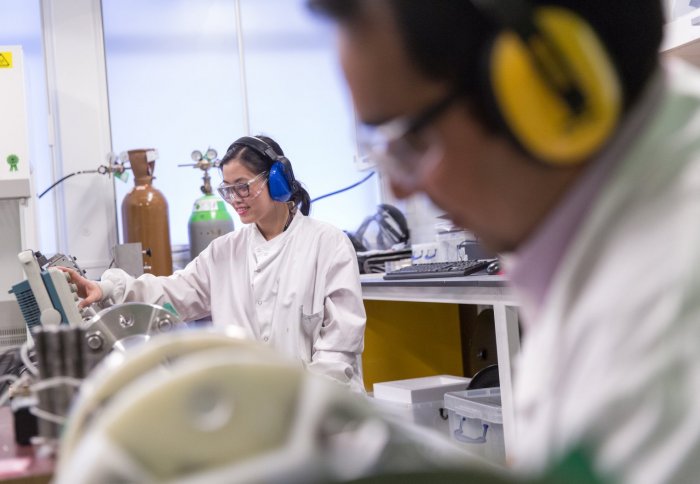London to become 'global epicentre' of biomedical engineering with GBP 20m award

A new Imperial research facility harnessing biomedical engineering to address major healthcare challenges will receive GBP 20m of government funding.
The investment by the Higher Education Funding Council for England (HEFCE) through the UK Research Partnership Investment Fund (UK RPIF) will support the development of a biomedical engineering hub at Imperial College London’s new White City Campus.
The facility, and its world-leading research, will be an epicentre of biomedical engineering innovation.
– Professor Alice Gast
President
The facility will bring together over 500 engineers, scientists and clinicians, collaborating to develop solutions to some of the world’s most pressing biomedical and healthcare problems.
Its research focuses include new technologies for the early detection, monitoring and treatment of cancers; the development of minimally invasive implants; regenerative medicine and technology to aid recovery from nervous system injuries.
The biomedical engineering hub will be the first and largest facility to occupy the Michael Uren Biomedical Engineering Research Hub, a 14 storey research building made possible thanks to an unprecedented £40 million gift from Imperial alumnus Sir Michael Uren OBE and his foundation.
It will house a clinical facility side-by-side with multidisciplinary laboratories and offices for translational research initiatives, providing patients with access to the latest innovations in healthcare.

Michael Uren Biomedical Engineering Research Hub
The building, due for completion in 2019, will house life-changing research into new and affordable medical technology, helping people affected by a diverse range of medical conditions.
Imperial College London’s President Alice P. Gast said: “Collaboration and multidisciplinary research are key pillars of Imperial’s strategy. Our White City campus embodies this. We are creating an environment for the serendipitous encounters, collaboration and networks that drive innovation.
“The Michael Uren Biomedical Engineering Research Hub is one of our remarkable multidisciplinary hubs at White City that address some of the world’s big challenges. Its vision, ambition and potential is unrivalled. The facility, and its world-leading research, will be an epicentre of biomedical engineering innovation.”
The co-directors of the multidisciplinary Biomedical Engineering Hub are engineer Professor Anthony Bull and Orthopaedic Surgeon Professor Justin Cobb.
Pioneering advances
Professor Bull said: “The College is renowned for its pioneering advances in medical technology. We know this can only be achieved by drawing expertise across disciplinary boundaries. We cannot work in silos. This funding will allow us to take a great leap forward by bringing together a critical mass of engineers, scientists, and clinicians on an unprecedented scale. The opportunities this presents are tremendous.”
Professor Cobb said:“Demand for medical and surgical interventions is rising exponentially, and will continue to do so as we remain active and live longer and more energetic lives: the challenge is to do more good to more people at a lower cost. Our rapidly aging population brings with it increasing incidences of debilitating conditions such as musculoskeletal disorders and dementia, which reduce the quality of life and increase the societal burden. This hub and its integrated clinical facility will create the space for us to build multidisciplinary teams around these real-world clinical problems here and now. We will develop and accelerate a range of inventions from bench to patient.”
 HEFCE Chief Executive, Madeleine Atkins, said: “This project demonstrates the role that our universities play in providing outstanding research for the benefit of the economy and society. It brings together researchers from a range of backgrounds to pool their knowledge and expertise to create maximum benefit in biomedical engineering. The UKRPIF programme gives excellent value for public funding by double matching finance from external sources”.
HEFCE Chief Executive, Madeleine Atkins, said: “This project demonstrates the role that our universities play in providing outstanding research for the benefit of the economy and society. It brings together researchers from a range of backgrounds to pool their knowledge and expertise to create maximum benefit in biomedical engineering. The UKRPIF programme gives excellent value for public funding by double matching finance from external sources”.
Imperial is one of two universities to receive support through this round of funding, alongside the LSE.
Universities and Science Minister Jo Johnson said: “Capitalising on the incredible research and innovation taking place in universities up and down the country is key to the UK’s long-term success.
“The successful bids from Imperial College London and the LSE demonstrate the breadth of the UK’s scientific expertise, and are exactly the types of projects our upcoming Industrial Strategy will look to support. This announcement – along with our investment of £2 billion per year by the end of this parliament for scientific research and development – highlights our commitment to ensuring we remain at the forefront of global science.”
Innovation district
The £20 million award follows £35 million of funding from UK RPIF in 2012 to support two interconnected facilities also based on the White City Campus. The I-HUB, opened in October, provides more than 185,000 square foot of space to translate cutting-edge research into commercial applications for the benefit of society. The connected Molecular Sciences Research Hub, will support the pioneering work of Imperial’s Department of Chemistry and other users to drive a new multi-disciplinary approach to molecular sciences.
At its White City Campus Imperial is working to develop an international innovation district, providing space for the College to adapt to the changing needs of its researchers, students, partners and local communities, as well as an environment to enable collaboration, co-location and partnership with business, academia, and non-profit, healthcare and government institutions.
Article text (excluding photos or graphics) © Imperial College London.
Photos and graphics subject to third party copyright used with permission or © Imperial College London.
Reporter
Deborah Evanson
Communications Division